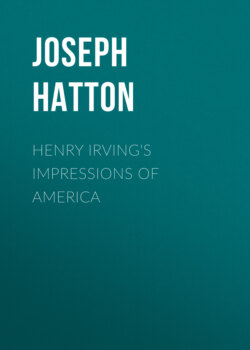Читать книгу Henry Irving's Impressions of America - Joseph Hatton - Страница 16
На сайте Литреса книга снята с продажи.
IV.
ОглавлениеTable of Contents
“ ‘Britannic’ ahead!” shouts a voice from the gangway. We clamber on deck. It is daylight. The air is still keen. The wooded shores of Staten island are brown with the last tints of autumn. Up the wide reaches of the river, an arm of the great sea, come all kinds of craft; some beating along under sail; others, floating palaces, propelled by steam. These latter are ferry-boats and passenger steamers. You have seen them in many a marine picture and panorama of American travel. The “Blackbird” is typical of the rest—double decks, broad saloons, tiers of berths, ladies’ cabins, and every ceiling packed with life-buoys in case of accident. We push along through the choppy water, our steam-whistle screaming hoarse announcements of our course. The “Britannic” lies calmly at quarantine, the stars and stripes at her topmast, the British flag at her stern. She is an impressive picture—her masts reaching up into the gray sky, every rope taut, her outlines sharp and firm. In the distance other ocean steamers glide towards us, attended by busy tugs and handsome launches. One tries to compare the scene with the Mersey and the Thames, and the only likeness is in the ocean steamers, which have come thence across the seas. For the rest, the scene is essentially American—the broad river, the gay wooden villas ashore, the brown hills, the bright steam craft on the river, the fast rig of the trading schooners; and above all the stars and stripes of the many flags that flutter in the breeze, and the triumphant eagles that extend their golden wings over the lofty steerage turrets of tug and floating palace.
Now we are alongside the “Britannic.” As our engines stop, the band of thirty Italians on our deck strikes up “God save the Queen.” One or two British hands instinctively raise one or two British hats, and many a heart, I am sure, on board the “Britannic” beats the quicker under the influence of the familiar strains. A few emigrants, with unkempt hair, on the after deck, gaze open-mouthed at the “Blackbird.” Several early risers appear forward and greet with waving hands the welcoming crowd from New York. One has time to note the weather-beaten color of the “Britannic’s” funnels.
“What sort of a passage?” cries a voice, shouting in competition with the wind that is blowing hard through the rigging.
“Pretty rough,” is the answer.
“Where is Mr. Irving?” cries out another “Blackbird” passenger.
“In bed,” is the response.
“Oh!” says the interrogator, amidst a general laugh.
“Beg pardon, no,” presently shouts the man on the “Britannic,”—“he’s shaving.”
Another laugh, drowned by a salute of some neighboring guns. At this moment a boat is lowered from the splendid yacht “Yosemite,” which has been steaming round about the “Britannic” for some time. It is Mr. Tilden’s vessel. He has lent it to Mr. Lawrence Barrett and Mr. William Florence. They have come out to meet Irving and Miss Terry, with a view to carry them free from worry or pressure to their several hotels. The two well-known actors are in the yacht’s pinnace, and some of us wonder if they are good sailors. The waves which do not stir the “Britannic,” and only gently move the “Blackbird,” fairly toss the “Yosemite’s” boat; but the occupants appear to be quite at home in her. She disappears around the “Britannic’s” bows to make the port side for boarding, and as she does so Mr. Irving suddenly appears between the gangway and the ship’s boats, on a level with the deck of the “Blackbird” about midships. “There he is!” shout a score of voices. He looks pale in the cold, raw light; but he smiles pleasantly, and takes off a felt bowler hat as the “Blackbird” gives him a cheer of welcome.
“Won’t you come here? The quarantine authorities object to our visiting the ship until the doctor has left her.”
A plank is thrust from our paddle-box, Irving climbs the “Britannic’s” bulwark, and grasps a hand held out to steady him as he clambers aboard the “Blackbird” right in the midst of the interviewers. Shaking hands with his manager, Mr. Abbey, and others, he is introduced to some of the pressmen, who scan his face and figure with undisguised interest. By this time Messrs. Barrett and Florence appear on the “Britannic.” They have got safely out of their boat and have a breezy and contented expression in their eyes. Irving now recrosses the temporary gangway, and is fairly embraced by his two American friends. The band strikes up, “Hail to the Chief!” Then the gentlemen of the press are invited to join Mr. Irving on board the “Yosemite.” They are arrested by what one of them promptly designates “a vision of pre-Raphaelitish beauty.” It is Miss Ellen Terry.[3] Every hat goes off as she comes gayly through the throng. “Portia, on a trip from the Venetian seas!” exclaims an enthusiastic young journalist, endeavoring to cap the æsthetic compliment of his neighbor. Escorted by Mr. Barrett, and introduced by Mr. Irving, she is deeply moved, as well she may be, by the novel scene. “Britannic” passengers crowd about her to say good-by; the band is playing “Rule, Britannia”; many a gay river boat and steamer is navigating the dancing waters; the sun is shining, flags fluttering, and a score of hands are held out to help Portia down the gangway on board the “Yosemite,” which is as trim and bright and sturdy in its way as a British gun-boat. While the heroine of the trip is taking her seat on deck, and kissing her hand to the “Britannic,” the “Yosemite” drives ahead of the ocean steamer. Mr. Irving goes down into the spacious cabin, which is crowded with the gentlemen against whose sharp and inquisitive interrogations he has been so persistently warned.
